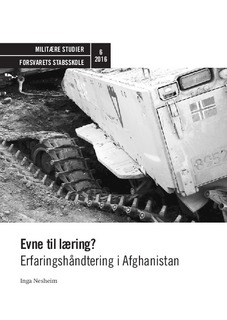| dc.description.abstract | For the Norwegian Armed Forces, participation in international operations has long been important. Norway’s NATO mission in Afghanistan (2001–2014) was the country’s most extensive military engagement since the Second World War. For more than seven years, Norway had lead responsibility for ISAF’s Provincial Reconstruction Team in Meymaneh, Faryab province. This mission was an important experience particularly for the Norwegian Army, allowing it to gain extensive practice in warfare. But what were the lessons learned? To understand how the Army processed its experiences, organizational theory is used. From an instrumental perspective, the Army’s patterns of learning are determined by formal structures, whereas from an institutional perspective, they are affected by informal norms, traditions, values, cultural rules, and conventions. | nb_NO |

